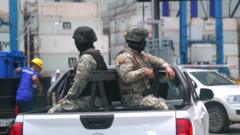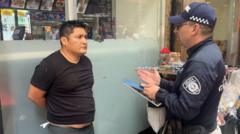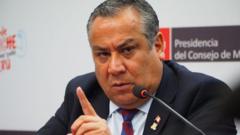**The narcotics trade in Ecuador, heavily intertwined with European demand for cocaine, is escalating violence and corruption, prompting urgent calls for action from both Ecuadorian officials and international law enforcement.**
**Ecuador's Cocaine Crisis: How European Demand Fuels a Deadly Trade**

**Ecuador's Cocaine Crisis: How European Demand Fuels a Deadly Trade**
**Exploring the alarming rise of Ecuador as a hub for cocaine trafficking driven by European consumption.**
Reality is unraveling in Ecuador as escalating drug trafficking proves to be a deadly epidemic, primarily influenced by booming European cocaine consumption. The nation has morphed into a critical conduit for illicit cocaine, with a staggering 70% of the world’s supply now transiting through its coastal ports. This situation has transformed Ecuador into a narcotics powerhouse despite its lack of local production.
César, a pseudonym for a member of the Latin Kings, recounts his descent into this dark underbelly, citing ruthless coercion and a simmering need for economic survival. He describes a chilling ultimatum from the Albanian mafia, one of the most formidable trafficking networks targeting Europe: "If you don't accept our offer, you die." His story reflects the dire circumstances through which organized crime flourishes—supply chains that ensnare not just gang members but ordinary citizens, such as truck drivers unknowingly transporting drugs.
Throughout 2024, murders connected to the drug trade surged, peaking in January with 781 killings, the worst toll in recent years. Corruption runs rampant among law enforcement, with officials sometimes complicit in smuggling operations. The innovative tactics deployed to transport cocaine—hiding drugs within legitimate cargo, breaching containers at ports, and attaching them to vessels at sea—underscore the desperation and danger inherent in the trade.
The Albanian mafia's infiltration has grown significantly since 2021, coinciding with increased point-to-point banana exports, which serve as perfect covers for drug trafficking. Prosecutors and legal experts like Monica Luzárraga express frustration at the systemic neglect, noting the connection between booming banana exports and organized crime. A staggering increase in cocaine seizures—nearly 300 tons last year—indicates that while law enforcement is ramping up its efforts, the tide continues to rise.
Ecuador's unique geographical position and resilient export sectors have attracted European criminal gangs, leading to tragic consequences for local communities and economies. The country faces an uphill battle against gang influence, compounded by the lingering economic fallout from the COVID pandemic and a strained national security apparatus.
Calls for an international response to combat the drug trade highlight the intricate linkage between consumer demand in Europe and the violence plaguing Ecuador. With the United Kingdom identified as a primary market for cocaine—with gross consumption estimations reaching 117 tonnes annually—the urgent plea from Ecuadorian leaders, including President Daniel Noboa, is for collaborative efforts to stem the demand as well as the supply.
“If they fight it there, it will end here,” César warns, channeling a collective sentiment focused on accountability for the foreign nations fueling this crisis. As Ecuador struggles for a foothold amid escalating violence and crime, the consequences of European drug consumption ripple back to impact everyday Ecuadorean lives, entrenching nations in a cycle of devastation promised to persist as long as demand grows unchecked.





















